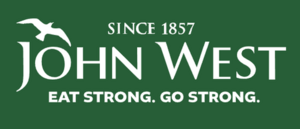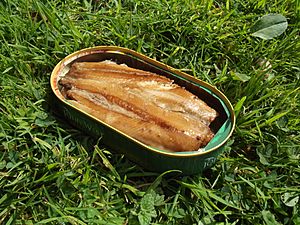John West Foods facts for kids
 |
|
| Seafoods | |
| Founded | 1857, as Pelling Stanley and Company |
| Owner | Thai Union Group |
John West Foods is a company based in the United Kingdom that sells seafood. It started in 1857 and is now owned by the Thai Union Group from Thailand. The company is well-known for its canned salmon and tuna. They also sell other seafood like mackerel, sardine, herring, and shellfish.
Contents
The Story of John West Foods
How the Company Began
The company started in 1857 in Liverpool, England. Two people, T. L. Pelling and C. H. Stanley, created a business called Pelling Stanley and Company. They soon became experts in importing canned food, which was a new and exciting product back then.
By 1879, they were importing canned salmon from a company in Oregon, USA, which was owned by a captain named John West. Pelling Stanley liked the name so much that they bought the rights to use "John West" in 1888. The first cans of John West Salmon appeared in stores in 1892.
Growing and Changing Owners
Over the years, John West Foods became part of bigger companies. By 1924, three different companies that sold canned goods were all connected to a large company called Unilever. These were:
- Angus Watson and Co.
- R B Green and Co.
- Pelling Stanley and Company
By 1964, Unilever brought all three of these companies together to form one big company: John West Foods. The company then grew even more, opening branches in Australia and Africa in 1974.
In 1997, another big food company, Heinz, bought the John West brand and most of its operations. However, the parts of John West in Australia, New Zealand, and South Africa stayed with Unilever. Later, in 2003, a company called Simplot Australia bought the John West canned fish business in Australia from Unilever.
In 2006, Heinz sold its European seafood business to a French company called MW Brands. Then, in 2010, a large seafood company from Thailand, the Thai Union Group, bought MW Brands. This made Thai Union Group the biggest canned-tuna producer in the world!
Being Responsible: Fishing and the Environment
Fishing for the Future
John West says that their salmon, mackerel, and sardine products are caught in a way that helps keep the oceans healthy. They are certified by the Marine Stewardship Council (MSC). This means their fishing methods are good for the environment and help make sure there are enough fish for the future. You can often see the MSC logo on their cans.
The company also states that they do not sell fish that are endangered or critically endangered. For example, they have never sold bluefin tuna, which is a type of tuna that many groups are trying to protect because it has been overfished. John West says they follow international rules for fishing and do not buy fish from illegal boats or those that use harmful fishing methods like drift nets. They also say they do not buy fish from boats that do not ban shark finning.
Challenges and Promises
Even with these claims, some groups have questioned John West's practices. In 2008, a conservation group called Greenpeace said that John West sold some of the least sustainable tinned tuna in the UK. They were concerned about fishing methods that could harm other sea animals like turtles and sharks.
In 2011, John West promised to get all of its tuna using more sustainable methods by the end of 2016. This included using "pole and line" fishing, which catches one fish at a time and is much better for the environment.
However, by 2016, John West had not kept this promise. Only a very small amount of their tuna was caught using the pole and line method. Greenpeace again ranked John West very low in tuna sustainability. John West explained that there wasn't enough pole and line tuna available to meet everyone's needs. But Greenpeace argued that if big companies like John West invested more, there would be more sustainable tuna available.
Tracking Your Tuna
In 2011, John West launched a "Can Tracker" on their website. This tool was meant to let customers find out exactly where the fish in their can came from, including the ocean and even the boat that caught it. This was a way to be more open about their fishing practices.
But in 2015, Greenpeace said that John West's tracking system was not fully honest. They found that many cans were from canneries in Thailand owned by John West's parent company, Thai Union. This information was not clearly shown on the website. The fishing industry in that area of Thailand had also faced concerns about working conditions.
John West said this was just a "website limitation." After the news spread, John West changed their website. They then told customers who wanted to trace cans from Thailand to email the company for more details.
The Famous Bear Commercial
In November 2000, John West released a very popular TV advertisement. It showed a funny scene of a bear fighting a fisherman over a fresh salmon. This video became very famous and was watched over 300 million times on YouTube. It was filmed in the beautiful Scottish Highlands, near Balmoral. The advertisement won many awards in the advertising industry.
See also
- Saupiquet, a French canned fish company
 | Valerie Thomas |
 | Frederick McKinley Jones |
 | George Edward Alcorn Jr. |
 | Thomas Mensah |


